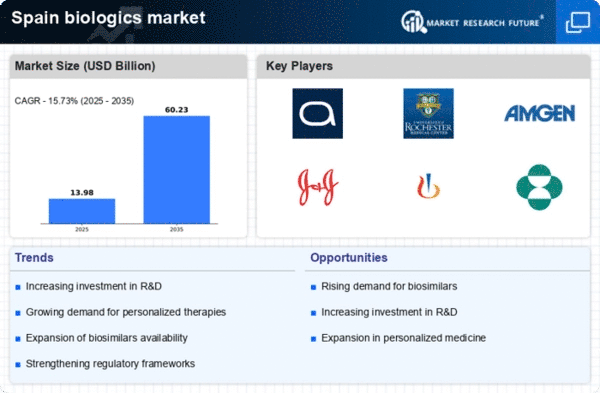Growing Focus on Rare Diseases
The growing focus on rare diseases is emerging as a crucial driver for the biologics market in Spain. With an estimated 7,000 rare diseases affecting millions of individuals, there is an increasing demand for specialized biologic treatments. The biologics market is responding to this need by investing in the development of orphan drugs, which are designed to treat these conditions. In 2025, the market for rare disease biologics is projected to grow by approximately 10%, reflecting the heightened interest from both pharmaceutical companies and healthcare providers. This trend is further supported by regulatory incentives that encourage the development of therapies for rare diseases, making it a promising area for growth within the biologics market.
Supportive Government Policies
Supportive government policies in Spain are fostering a conducive environment for the biologics market. Initiatives aimed at promoting biotechnology and biopharmaceutical innovation are being implemented, including funding programs and tax incentives for research and development. The Spanish government has set ambitious goals to enhance the country's position in the biotechnology sector, with plans to increase investment in biopharmaceuticals by 15% over the next five years. These policies not only encourage domestic companies to innovate but also attract foreign investment, thereby strengthening the biologics market. As a result, the collaboration between public and private sectors is likely to accelerate the development of new biologic therapies, ultimately benefiting patients and healthcare systems.
Increasing Healthcare Expenditure
The rising healthcare expenditure in Spain is a pivotal driver for the biologics market. As the government allocates more funds towards healthcare, the demand for advanced therapeutic solutions, including biologics, is likely to increase. In 2025, healthcare spending in Spain is projected to reach approximately €200 billion, reflecting a growth rate of around 5% annually. This financial commitment enables the development and commercialization of innovative biologics, which are essential for treating complex diseases. Furthermore, the increasing prevalence of chronic conditions necessitates the adoption of biologics, thereby propelling market growth. The biologics market stands to benefit significantly from this trend, as healthcare providers seek effective treatments that can improve patient outcomes and reduce long-term healthcare costs.
Rising Incidence of Autoimmune Diseases
The rising incidence of autoimmune diseases in Spain is a significant driver for the biologics market. Conditions such as rheumatoid arthritis, lupus, and multiple sclerosis are becoming increasingly prevalent, necessitating effective treatment options. In recent years, the number of diagnosed cases has surged, with estimates suggesting that autoimmune diseases affect approximately 5% of the population. This growing patient population creates a substantial demand for biologic therapies, which are often more effective than traditional treatments. The biologics market is poised to expand as pharmaceutical companies invest in research and development to create targeted biologic therapies that address these complex conditions. The increasing awareness and diagnosis of autoimmune diseases further contribute to the market's growth potential.
Technological Advancements in Biomanufacturing
Technological advancements in biomanufacturing processes are transforming the biologics market in Spain. Innovations such as continuous manufacturing and process analytical technology (PAT) enhance the efficiency and scalability of biologics production. These advancements not only reduce production costs but also improve product quality and consistency. In 2025, the biomanufacturing sector is expected to witness a growth of approximately 8%, driven by these technological improvements. The biologics market is likely to experience increased competition as companies adopt these cutting-edge technologies to streamline operations and meet the growing demand for biologics. As a result, the ability to produce high-quality biologics at a lower cost may lead to greater accessibility for patients, further stimulating market growth.
















